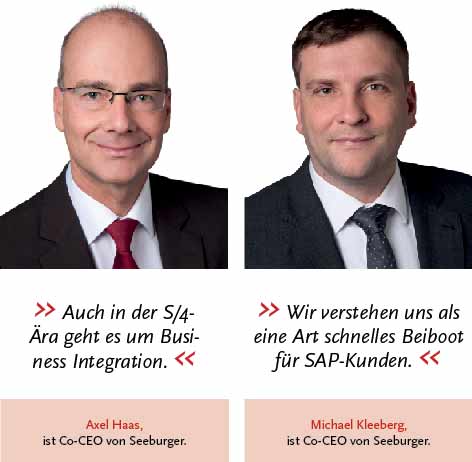SAP focus yesterday, today, tomorrow
![[shutterstock:572045002, Mirexon]](https://e3mag.com/wp-content/uploads/2017/02/shutterstock_572045002.jpg)

Seeburger has been operating with a strong SAP connection for decades now. Will this change in the Hana or S/4 Hana era?
Axel Haas: Our fundamental strategic orientation is forced and strengthened by the next generation of the Business Suite S/4 Hana.
We address SAP customers with sophisticated solutions for B2B integration as well as with customized and demand-driven B2B EAI solutions for different industries in the same way as we always have.
The S/4 era is also about business integration such as connecting business partners or process integration and process improvements.
And that worldwide and across company boundaries.
But it could be that with S/4, various processes or functionalities are virtually transferred to the SAP standard or various transcations are newly merged, with effects on partner solutions, right?
Michael Kleeberg: As a long-standing partner, we are in a continuous exchange of information with SAP regarding S/4 and its industry variants today and tomorrow.
Seeburger Business Integration Suite BIS is S/4 compatible and supports S/4 as the so-called digital core in business transformation projects.
If enhancements or new solutions are required - whether for the Business Integration Suite or for our BIS-related applications - we will implement them promptly.
This was the case here and there with the change from R/2 to R/3 and also with SAP ECC.
We have always seen ourselves as a kind of fast dinghy for SAP customers, capable of responding quickly to new requirements in a solution-oriented manner.
How was Seeburger's cloud offering received, especially by SAP users? After all, their inclination to move company-relevant data or even their entire ERP to the cloud is still limited.
Haas: Companies - be they SAP customers or non-SAP user companies - do not generally refuse cloud computing. You have to differentiate here.
A very large proportion of our customers from the SAP environment use our cloud offering intensively and have come to appreciate it very much.
This is also because they can use it to quickly implement new integration requirements - be it a functional issue such as e-invoicing or a new technical requirement that would otherwise necessitate a major investment in in-house operations.
Security concerns or privacy requirements often still stand in the way of the cloud. Seeburger also scores here with a wide range of private cloud to public cloud offerings - and of course with our highly secure ISO 27001-certified German data centers along with contracts under German law.
The fact is that cloud usage is now ahead of on-premise usage at Seeburger when comparing license revenue with cloud revenue.
Kleeberg: Those who want to can select and book a variety of cloud services based on industry best practices via the Seeburger Cloud Store, companies from the logistics, automotive or retail sectors, for example.
Companies from the utility sector, for example, can use a ready-made cloud web application for energy trading - including automated interfaces to trading systems provided by our underlying BIS platform.
Or web applications for electronic invoicing, for connecting partners such as suppliers and much more besides classic exchange/mapping solution offerings.
Seeburger had the foresight to focus on the cloud at an early stage.






